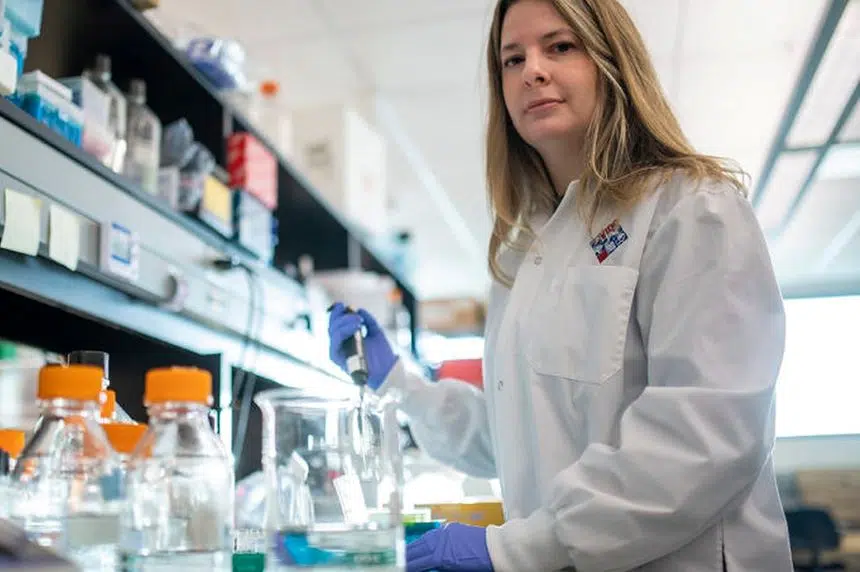It has only been a day since Canada became the third country in the world to approve the Pfizer COVID-19 vaccine for emergency use, after the United Kingdom and Bahrain.
While Pfizer’s work has been published and reviewed, there are still concerns among many in the general public about the vaccine’s safety and long-term efficacy.
The University of Saskatchewan’s Dr. Alyson Kelvin is a virologist and a vaccinologist who specializes in emerging viruses that are crossing over from animals and infecting people. The goal of her work is to develop new vaccines for new possible pandemic threats.
She has extensively studied SARS CoV2 — which causes COVID-19 — and how it makes people sick and the interaction of the virus with the human body. Right now, she’s using that information to develop and evaluate COVID-19 vaccines.
She has read the United States Food and Drug Administration’s report on the Pfizer vaccine, which contains its safety and toxicity data, its clinical data, and data from Phase 1 to 3 clinical trials.
She says the safety data was robust, and Phase 3 data had two “arms:” The first, in which people got a placebo, and the other, in which people got the vaccine. She says there were very small differences between the two.
Initial immune reaction among more than 44,000 participants showed typical reactions similar to those many people experience when they get a flu shot, like a sore arm, possible fever, mild fatigue or muscle aches, she explained.
“Many of those initial reactions were noted in people who received the vaccine, which just illustrates that the vaccine is working and teaching your immune system something,” she said.
There weren’t any recorded serious adverse events in the Phase 3 clinical trials, she added.
However, during the first day of immunizations in England, two health-care workers who got their vaccine shots had an anaphylactic reaction.
Kelvin says that is an adverse event, but it happens sometimes, even with flu vaccines or other types of vaccines. That’s why people are asked to remain in a clinical setting 15 minutes after they get a vaccination.
“Allergic reactions can sometimes occur after receiving a vaccine, although the likelihood is quite small,” Kelvin said. “With these two health-care workers, both of them had a history of significant and severe allergic reactions, where they carried a life-saving Epi-pen. This is an important point, because it means that these people have what we call ‘hypersensitivity,’ so they have an immune system that is hyper-reactive to foreign material.”
So far, she says Health Canada has not recommended against any particular group getting the COVID-19 vaccination, although it’s monitoring the investigation in England.
For those who are wary of the new mRNA Pfizer or Moderna vaccines because they were developed so quickly, Kelvin says the technology that has gone into that has been in clinical trials for about 10 years and has been used to work on the development of other coronavirus vaccines for MERS (Middle Eastern Respiratory Syndrome).
“These vaccines have been in development for quite a long time so that we could be ready for an emerging virus that spills over into the human population that might have a pandemic threat,” she said.
Results of longer-term effects of the vaccines have not been completed or published yet, as well as the long-term efficacy of the vaccines.
“There’s still a couple of questions left,” Kelvin said.
Other Pfizer studies are now underway include how the vaccines affect two other important groups.
“It’s quite typical for two groups to be excluded from the human clinical trial evaluations of new therapies and vaccines, and that’s children and pregnant women. That’s exactly what we saw with these vaccines,” she said.
For those who argue that yearly influenza vaccines are at best between 40 and 70 per cent effective and that the common cold can consist of coronavirus strains, Kelvin has this to say:
“SARS CoV2 is a different virus. It’s not the same as our seasonal coronaviruses and definitely it’s not an influenza virus … We’re lucky that SARS CoV2 has a lower mutation rate, meaning that developing a vaccine for a coronavirus, we’ve a better chance of providing protection because the virus isn’t out there changing as quickly, leading to the vaccine that we have being ineffective.”
For anyone who is hesitant about getting the vaccines developed so far, Kelvin encourages people to ask questions.
“(Vaccines) are new, and this is a brand new virus,” she said. “Make sure you’re asking the right questions to the right people — your doctor, your pharmacist or other health-care professionals.”











